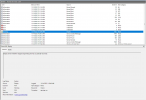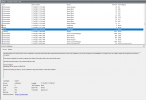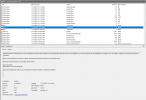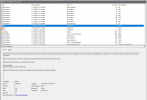Hello everyone,
so I manage to install windows on proxmox with nvidia drivers and parsec. VM has gpu passthrough RTX 3090. I can boot and it seams work good. But VM work stable by 5-15 minutes (in IDLE, game or on web browser), next get crash and restart. Parsec show messange "connection lost" and VM use full cpu range, typical behaviour for blue-screen.
This situation isn't depended of windows version 10 or 11, or nvidia drivers version 526.86 or 512.59.
Anybody has hints for me how I can troubleshoot from here?
Server spec:
- HP DL380 g9 (2x E5-2683 v4, 64gb ram, 2x PSU 500W)
- INNO3D RTX 3090 X3
- debian 11.5 bullseye
- proxmox 7.2-11
/etc/default/grub:
/etc/modprobe.d/blacklist.conf
/etc/modprobe.d/iommu_unsafe_interupts.conf
/etc/modprobe.d/kvm.conf
/etc/modprobe.d/vfio.conf
lspci -knn
VM hardware
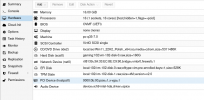
VM options
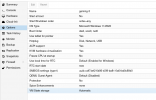
VM config file
so I manage to install windows on proxmox with nvidia drivers and parsec. VM has gpu passthrough RTX 3090. I can boot and it seams work good. But VM work stable by 5-15 minutes (in IDLE, game or on web browser), next get crash and restart. Parsec show messange "connection lost" and VM use full cpu range, typical behaviour for blue-screen.
This situation isn't depended of windows version 10 or 11, or nvidia drivers version 526.86 or 512.59.
Anybody has hints for me how I can troubleshoot from here?
Server spec:
- HP DL380 g9 (2x E5-2683 v4, 64gb ram, 2x PSU 500W)
- INNO3D RTX 3090 X3
- debian 11.5 bullseye
- proxmox 7.2-11
/etc/default/grub:
Code:
GRUB_DEFAULT=0
GRUB_TIMEOUT=5
GRUB_DISTRIBUTOR=`lsb_release -i -s 2> /dev/null || echo Debian`
GRUB_CMDLINE_LINUX_DEFAULT="quiet intel_iommu=on"
GRUB_CMDLINE_LINUX=""/etc/modprobe.d/blacklist.conf
Code:
blacklist nouveau
blacklist nvidia
blacklist radeon
blacklist nvidiafb
blacklist snd_hda_intel/etc/modprobe.d/iommu_unsafe_interupts.conf
Code:
options vfio_iommu_type1 allow_unsafe_interrupts=1/etc/modprobe.d/kvm.conf
Code:
options kvm ignore_msrs=1/etc/modprobe.d/vfio.conf
Code:
options vfio-pci ids=10de:2204,10de:1aef disable_vga=1lspci -knn
Code:
0b:00.0 VGA compatible controller [0300]: NVIDIA Corporation GA102 [GeForce RTX 3090] [10de:2204] (rev a1)
Subsystem: NVIDIA Corporation GA102 [GeForce RTX 3090] [10de:1454]
Kernel driver in use: vfio-pci
Kernel modules: nvidiafb, nouveau
0b:00.1 Audio device [0403]: NVIDIA Corporation GA102 High Definition Audio Controller [10de:1aef] (rev a1)
Subsystem: NVIDIA Corporation Device [10de:1454]
Kernel driver in use: vfio-pci
Kernel modules: snd_hda_intelVM hardware

VM options

VM config file
Code:
args: -cpu 'host,+kvm_pv_unhalt,+kvm_pv_eoi,hv_vendor_id=NV43FIX,kvm=off'
audio0: device=ich9-intel-hda,driver=spice
bios: ovmf
boot: order=ide2;scsi0;net0
cores: 16
cpu: host,hidden=1,flags=+pcid
efidisk0: local:102/vm-102-disk-0.raw,efitype=4m,pre-enrolled-keys=1,size=528K
hostpci0: 0000:0b:00,pcie=1,x-vga=1
ide2: local:iso/Win11_22H2_Polish_x64.iso,media=cdrom,size=5311480K
machine: pc-q35-7.0
memory: 16384
meta: creation-qemu=7.0.0,ctime=1668287862
name: gaming-3
net0: rtl8139=3A:33:EC:8E:C9:90,bridge=vmbr0,firewall=1
numa: 0
ostype: win11
scsi0: gaming:102/vm-102-disk-0.raw,size=160G
scsihw: virtio-scsi-single
smbios1: uuid=cdf74ef2-6486-45f9-ba81-0a61bd0c8940
sockets: 1
tpmstate0: local:102/vm-102-disk-1.raw,size=4M,version=v2.0
vga: none
vmgenid: 0b1630e9-bdd9-488a-9469-fb481908da9c

